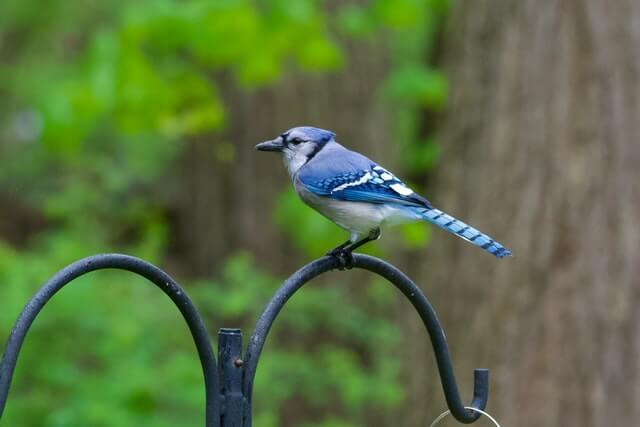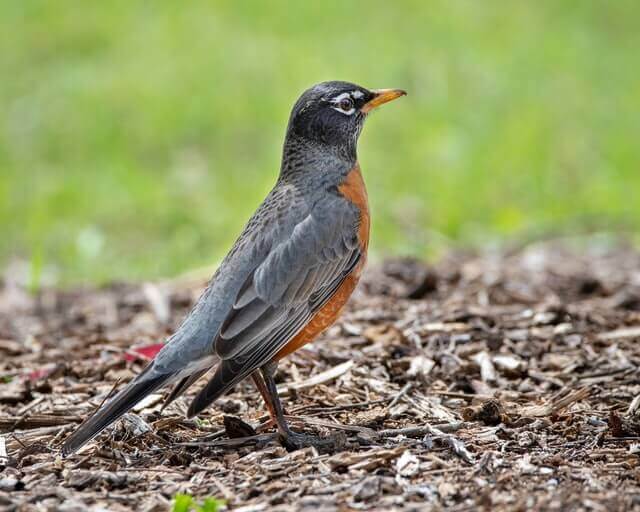Hey there! Looking for a bit of good luck in your life? Maybe some feathered friends can help you out! People have been turning to birds for good fortune for centuries – it’s not just an old wives’ tale. From bringing in the cash to boosting your love life, there are all sorts of beliefs about lucky birds.
We’ve rounded up 17 birds that bring good luck and looked into the meanings and symbolism behind them. So, if you’re keen on learning more about lucky birds and seeing if any of them will cross your path, read on!
Table of Contents
- 1 Birds That Bring Good Luck
- 2 Blue Jay
- 3 Cardinal
- 4 Magpie
- 5 Rooster
- 6 Duck
- 7 Dove
- 8 Robin
- 9 Woodpecker
- 10 Owl
- 11 Crane
- 12 Peacock
- 13 Stork
- 14 Pigeon
- 15 Swallow
- 16 Hummingbird
- 17 Bluebird
- 18 Quetzal
- 19 Bringing Lucky Birds to Your Garden or Home
- 20 The Science Behind Lucky Birds
- 21 Beliefs and Practices Related to Lucky Birds
- 22 Conclusion
- 23 Frequently Asked Questions
- 24 Author
Birds That Bring Good Luck
Blue Jay
The blue jay, with its vibrant hues and sharp intelligence, has captivated the imagination of people across cultures for centuries. In the eyes of Native Americans, the sight of a blue jay signifies that you’re on the right path – a reassuring omen when you’re feeling lost or uncertain.
Meanwhile, the Aztecs viewed the blue jay as an emissary from their god, Quetzalcoatl, while Chinese lore tells the story of a cunning man who transformed into the bird to evade his pursuers. Whether you believe in destiny or not, the blue jay’s symbolic association with good fortune is enough to make anyone’s heart flutter with hope.
Read more: What Attracts Blue Jays to your Yard?(Expert Tips)
Cardinal
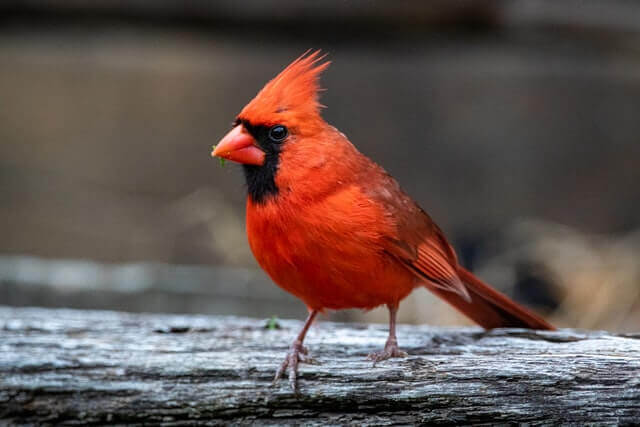
The cardinal, a feathered friend revered for its stunning red plumage, has long been hailed as a symbol of good fortune. With its radiant hue, the male cardinal brings a burst of warmth and vitality to even the coldest and dreariest of days. Some even say that setting eyes on one of these birds can usher in a trifecta of happiness: warmth, vitality, and joyfulness.
In the United States, the cardinal’s arrival is eagerly anticipated as a harbinger of springtime renewal and rejuvenation. Its vibrant presence adds an element of beauty and magic to the world around us, a much-needed balm for the winter-weary soul.
Read more: Cardinal Bird Facts Every Birdwatcher Should Know!
Magpie
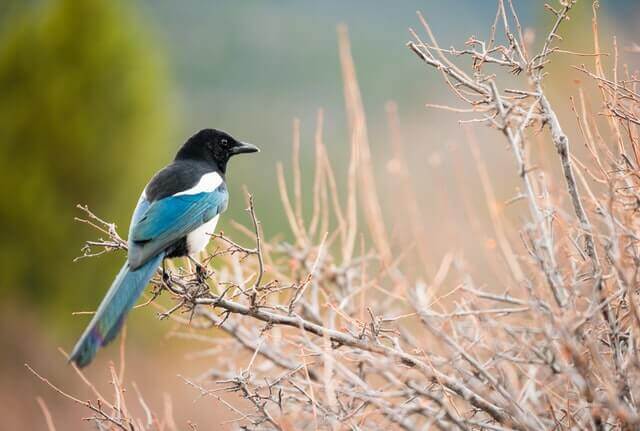
The magpie, with its iridescent feathers and distinctive chatter, has long been revered as a bearer of good luck and fortune in many cultures. Legends have it that these birds have the gift of foresight, able to predict events that will bring joy and prosperity. Spotting a magpie is considered a serendipitous omen, a sign of wonderful things to come.
But the magpie’s influence goes beyond its auspicious reputation. Living in groups with their own hierarchy, these birds embody the value of peaceful coexistence. They serve as a reminder that harmony and collaboration can lead to a prosperous and fulfilling life. In a world that can often feel chaotic and tumultuous, the magpie’s presence is a beacon of hope and promise.
Read more: How to Attract Magpies to your Garden? (In 4 Easy Steps!)
Rooster
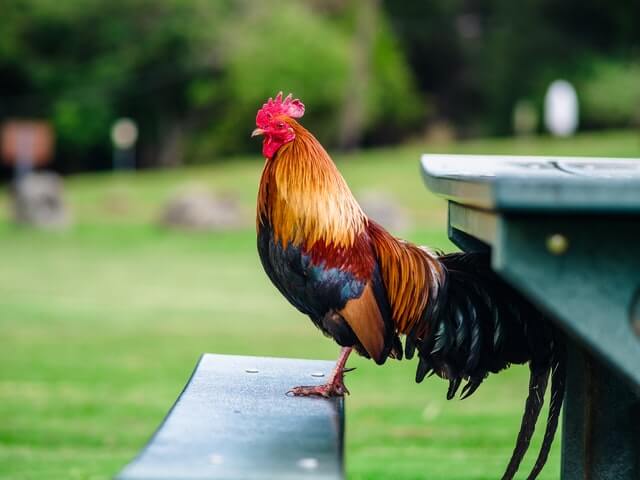
With its striking plumage and mighty crow, the rooster has long been hailed as a symbol of good fortune in many cultures. In Ireland, a rooster’s morning call is said to bring blessings of luck and abundance for the day ahead. Across the world, in Japan, sighting a white rooster is believed to signal the arrival of wealth and prosperity for the fortunate observer.
And it’s not just any old rooster that brings good tidings – in Japanese culture, it’s a solo crowing that bodes particularly well for the future. So next time you hear a rooster’s call, listen closely – it could be a message of good things to come.
Duck

Legend has it that the sight of ducks soaring through the sky foretells a shower of riches heading your way. This tradition has persisted for centuries, with ancient societies regarding these feathered creatures as symbols of prosperity, vitality, and blissful harmony. In some regions of Asia, even a lone duck is thought to be an omen of good fortune.
But if you’re lucky enough to spot a squadron of seven ducks, that’s when things really start to quack – this is believed to signify a flood of abundance and joy about to grace your life. So keep your eyes peeled and let the ducks guide you to a bountiful future!
Read more: 23 Fun Facts About Ducks in 2023 (Complete Guide!)
Dove
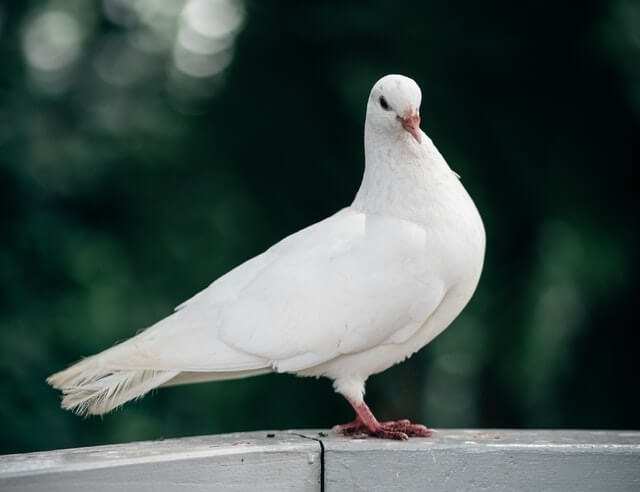
Doves are a sign of good luck. The Romans thought that they could predict the future and often left them as offerings to gods. They also used doves for sacrifice, which was their way of asking the gods for protection and guidance in battle.
Doves were considered symbols of peace by many different cultures such as the Egyptians, Greeks, Celts, Assyrians and Hebrews who associated them with hope or joy because they represent purity and innocence.
Read more: 25 Fun Facts About Mourning Doves (A Complete Guide!)
Robin
The delightful chirps of robins are a pleasant reminder of spring’s arrival. However, these feathered fellows aren’t just a sign of the season’s change. They are also regarded as a harbinger of good luck. The robin’s arrival is often believed to bring with it joy, new beginnings, and personal growth.
Some even believe that catching sight of a robin means that a departed loved one is keeping a watchful eye, bringing comfort and reassurance. With their striking red feathers and sweet songs, robins have captured hearts and imaginations worldwide, signifying the promise of fresh starts and the possibility of good things to come.
Read more: How To Attract Robins To Your Yard? A Step-By-Step Guide!
Woodpecker
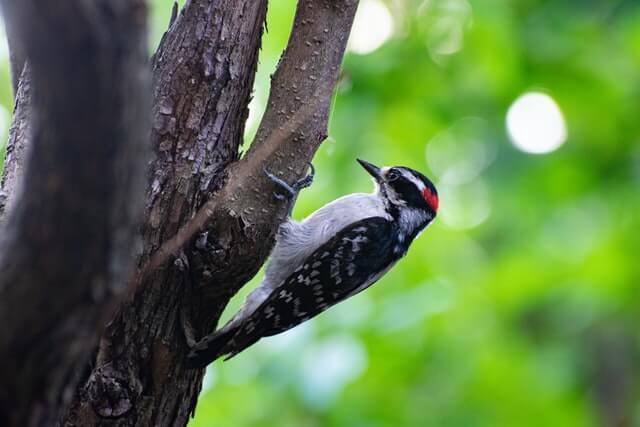
Woodpeckers are a great way to start the day with positive energy and good luck. Woodpeckers have been known for bringing wealth, fertility, happiness, healing power and protection against evil spirits or bad fortune.
The sight of a woodpecker brings joy and happiness to its viewers, and it also means that someone will soon receive some type of gift or money from another person. Many cultures around the world believe in this legend, but it has become especially popular in North America over time.
Owl
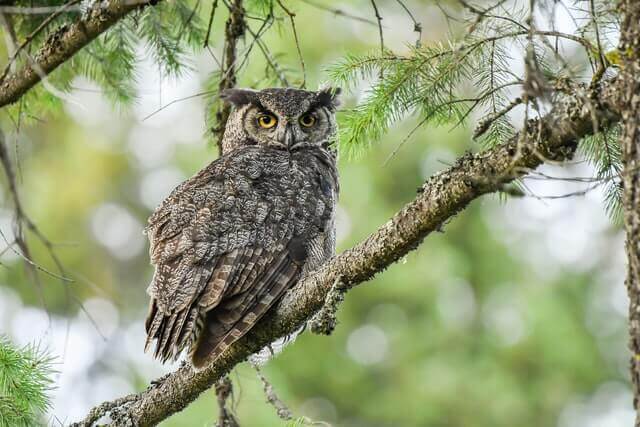
Owls are often associated with good luck, fortune and wisdom. Some people believe that the owl’s ability to see in the dark is a sign of protection against evil spirits. For some cultures, they represent the guardian of the night and are believed to be a sign that someone is watching over you.
Others believe that seeing an owl in your dream means good fortune will come your way soon. In Ancient Greece, people believed that the owl was a messenger from the gods.
Read more: 17 Fun Facts About Owls in 2023: That Might Surprise You!
Crane
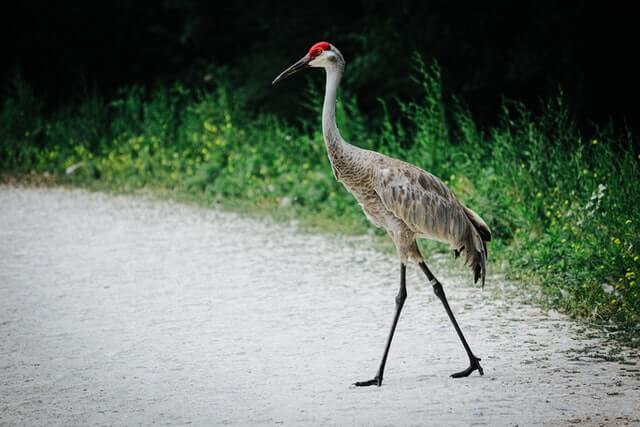
Cranes are the symbol of good luck. In some cultures, they’re thought to bring a prosperous future and signify good fortune. Cranes are also associated with rebirth because they mate for life and their offspring typically survive into adulthood; therefore, when one crane dies, another is born.
They have always been considered symbols of peace and happiness and represent eternal love. Cranes are often seen around weddings because people believe it will bring good fortune to them.
Read more: 60 Interesting Facts About Common Cranes (Detailed)
Peacock

In ancient times, people believed that peacocks could predict good or bad luck and would protect their homes from evil spirits. It is also said that if a person who has recently committed an unpardonable sin sees a peacock, he will be forgiven for his sins by Buddha.
In Chinese culture, it is said that “A flock of peacocks dances on the lawn.” This means that all goes well with someone’s life.
Read more: Can Peacocks Fly? (The Truth Finally Revealed!)
Stork
Storks are a popular symbol of good luck in many cultures. This is due to the stork’s association with babies and fertility. The ancient Greeks, for example, believed that if a mother had 10 children she would be rewarded by being turned into a stork.
Storks have been delivering babies to families since Ancient Greece, when they were seen as harbingers of fertility and happiness because their nests were often full of baby birds.
Pigeon
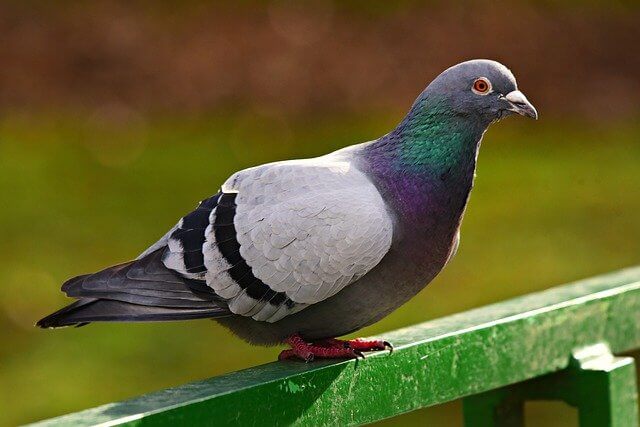
Pigeons are often seen as symbols of good luck and wealth. For example, in Hinduism, it is considered bad luck to kill pigeons because they represent peace. In some cultures, such as American culture and European culture, pigeons have been associated with a symbol for luck since ancient times.
In Christianity, for example, it was believed that when Noah’s Ark landed on Mount Ararat, the first bird to set foot on dry land was a pigeon.
Read more: Birds that look like Pigeons (Photos, ID & Stats)
Swallow
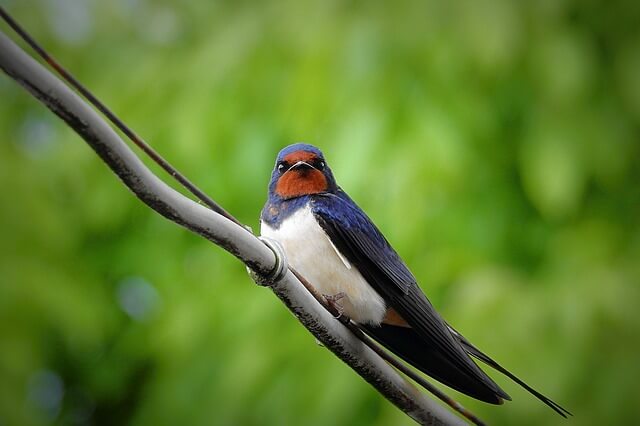
Many cultures around the world have legends that depict swallows as a symbol of good luck. In China, people believe that if they see a swallow in their house, it will bring them happiness and prosperity. In Japan, there is an old saying that says, “The swallow returns to its nest only when all is well.”
One very famous belief is that swallows returning to their nests before sunset brings good luck for fishermen on the water, while some people believe that having a swallow nest near your home symbolizes protection from fire or other calamities, such as storms or lightning strikes.
Read more: How to Attract Swallows to my Yard? (The Expert’s Guide)
Hummingbird

Hummingbirds are a symbol of good luck. In ancient times, the hummingbird was considered to be an omen for fertility and prosperity. They have been revered in many cultures for their beauty and strength.
They also represent a sense of lightness, freedom, swiftness, intelligence and agility which can serve as inspiration for those who find themselves faced with obstacles on their journey through life.
Read more: 31 Flowers That Attract Hummingbirds (Photos, ID & Info!)
Bluebird
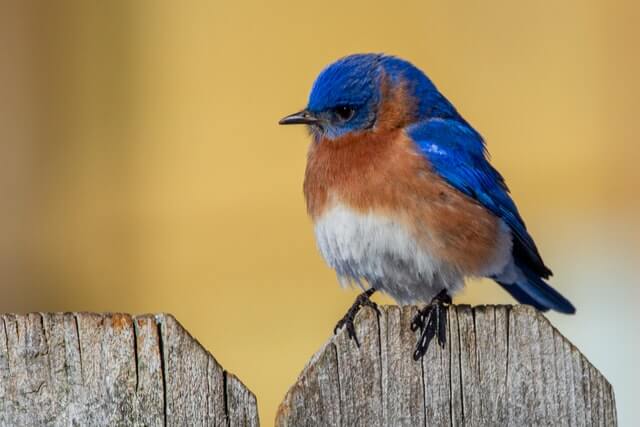
In the mystical tales of Native American culture, the bluebird soared as a harbinger of good luck and bliss. Its ethereal wings shimmered with a celestial shade of blue, encapsulating the very essence of joy and symbolizing the dreams and aspirations of the people. Legend has it that the mere sighting of a bluebird could lift the spirits, signaling a time of prosperity and delight.
With its angelic warbles and gentle presence, the bluebird whispered a message of gratitude, urging everyone to embrace life and cherish its treasures. For the bluebird embodied the truth that blessings are just a flutter away, waiting to be discovered and cherished.
Quetzal
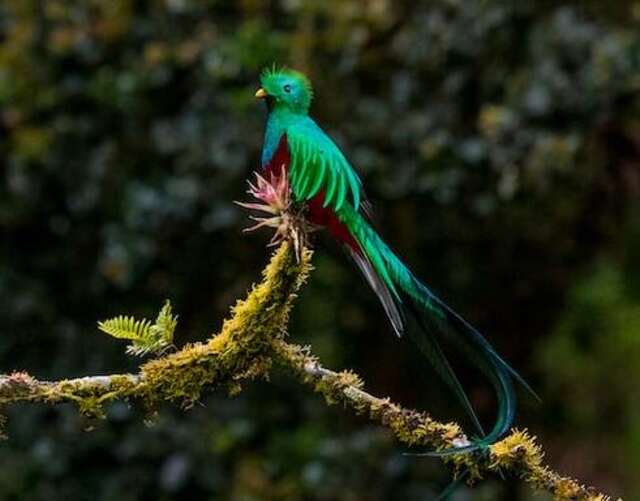
Deep in the verdant jungles of the Mayan civilization, amidst the cacophony of sounds that echoed through the dense foliage, there was a bird that dazzled with its radiant green plumage and long, flowing tail feathers. The bird was none other than the quetzal, a symbol of freedom and good luck to the people of the Mayan civilization.
To the Mayans, the quetzal embodied their hopes and dreams of liberation, soaring above the oppression that weighed them down. The quetzal’s striking beauty was celebrated in art and literature, as the Mayans believed that by capturing the essence of the bird, they could capture its good fortune and freedom.
Bringing Lucky Birds to Your Garden or Home
Attracting lucky birds to your garden or home requires creating a welcoming environment that meets their needs. Here are some suggestions and approaches to consider:
- Provide food: Many lucky birds are attracted to specific types of food, such as fruits, seeds, or nectar. Research the dietary preferences of the birds you want to attract and provide the appropriate food sources.
- Use bird-friendly plants: Certain plants, such as sunflowers or hollyhocks, are known to attract lucky birds. Choose plants that provide food, shelter, and nesting opportunities.
- Provide water: All birds need access to clean water for drinking and bathing. Consider adding a bird bath, fountain, or pond to your garden.
- Create shelter: Birds need places to hide from predators and inclement weather. Provide birdhouses, shrubs, or trees for shelter and nesting.
- Minimize hazards: Avoid using pesticides or other chemicals in your garden that may harm birds.
- Also, consider using window decals or bird netting to prevent bird collisions.
By implementing these tips and creating a bird-friendly habitat, you can increase the likelihood of attracting lucky birds to your garden or home. With a little patience and dedication, you can create a space that is not only beautiful, but also brings good fortune.
The Science Behind Lucky Birds
Ecological Reasons for Lucky Birds
Many birds that are considered lucky in various cultures and traditions are also viewed as indicators of healthy environments.
For example, the bluebird is often associated with happiness and good fortune because it thrives in areas with ample food and nesting opportunities.
Similarly, the crane is seen as a symbol of good luck in many cultures because it is a migratory bird that heralds the arrival of spring and the renewal of life.
Evolutionary Reasons for Lucky Birds
Humans may have developed positive associations with certain birds due to their beauty, song, or behaviors.
For instance, the hummingbird, which is often associated with love and good luck, is known for its iridescent plumage and its ability to hover in midair.
The peacock, another bird that is considered lucky in some cultures, is recognized for its beautiful feathers and its elaborate courtship displays.
The Cultural Significance of Lucky Birds
The science behind lucky birds suggests that our positive associations with them may be rooted in both ecological and evolutionary factors.
By understanding these factors, we can gain a deeper appreciation for the cultural significance of lucky birds and their role in human history and mythology.
Lucky birds have been a part of human culture for centuries, and they continue to be a source of fascination and inspiration for many people today.
Beliefs and Practices Related to Lucky Birds
Cultural and Spiritual Beliefs
Lucky birds have specific cultural or spiritual significance in different parts of the world. For instance, the Phoenix is a symbol of rebirth and immortality in Chinese, Japanese, and Greek mythology.
Similarly, the eagle is revered as a sacred bird that embodies strength, courage, and spiritual power in some Native American cultures.
Incorporating Lucky Birds into Daily Life and Rituals
People around the world have found different ways to incorporate lucky birds into their daily lives and rituals. Some cultures believe that carrying or wearing an image of a lucky bird can bring good fortune. Others create art or crafts featuring these birds as a way to attract positive energy.
Additionally, some people incorporate lucky birds into their daily prayers or meditations, believing that these birds can help them connect with the divine and access higher levels of consciousness.
Overall, the cultural and spiritual significance of lucky birds varies widely across different regions and traditions.
However, one thing is clear: these birds continue to fascinate and inspire people of all ages and backgrounds, and they remain an enduring symbol of hope, luck, and possibility.
Conclusion
In conclusion, lucky birds have captured the imagination of people around the world for centuries. This article has explored some of the most popular and fascinating birds that are believed to bring good luck, as well as the cultural and spiritual significance of these birds.
To recap, we’ve learned about various lucky birds including the crane, owl, and swallow, and their unique characteristics and associations with good luck. We’ve also explored the science behind these beliefs, as well as other cultural and spiritual practices related to lucky birds.
For those interested in learning more about lucky birds, we recommend researching the specific birds mentioned in this article and their cultural significance in different parts of the world.
Additionally, observing and appreciating the beauty of birds in general can bring a sense of joy and wonder, and who knows, maybe a little bit of good luck as well.
In the end, whether you believe in the power of lucky birds or not, there’s no denying the beauty and magic that these winged creatures bring into our lives.
Frequently Asked Questions
What is the spiritual meaning of a bird flying in your house?
When a bird visits your home, it’s often viewed as a signal from a higher power. Each species of bird has its unique symbolism, and recognizing these interpretations can assist you in figuring out what kind of communication this feathered visitor might be conveying.
A dove is a symbol of love and peace, whereas ravens are often associated with wisdom and knowledge. Swallows, on the other hand, are commonly believed to bring good luck and happiness, although some cultures consider them as an omen of death or misfortune.
Which bird is considered as a symbol of peace?
The dove is the symbol of peace. Doves are often used as a sign of peace, love and friendship. It is also one of the most common symbols in religion, with examples such as Noah’s Ark or The Holy Spirit.
The dove has been an emblematic animal for centuries and its meaning has evolved over time from being a representation of lust to being a symbol for freedom, tolerance and even rebirth.
Are crows good luck?
Some people believe that seeing a crow is good luck. The legend goes that if you see a black bird flying overhead, then the bird has come to bring you luck and happiness.
In some cultures, crows are believed to be messengers of the gods or symbols of fertility and protection.
However, there are also many cultures who associate crows with death or misfortune because they believe these birds carry away human souls.
What does a bluebird represent spiritually?
Many people believe that the bluebird is a spiritual animal. It can symbolize hope, love, peace, happiness, and purity to many people. Some people also think that it brings good luck or represents healing to them personally.
Are hawks good luck or bad luck?
If you have a hawk in your yard, it means good luck. There are many legends about hawks that range from the bird being an animal of power to bring happiness and wealth.
In fact, many Native American tribes believe that the hawk has supernatural powers to keep evil spirits away. The most common belief is that when a person sees a Hawk for the first time, they will be blessed with good fortune.
Related Post: 8 Birds that Bring Bad Luck


